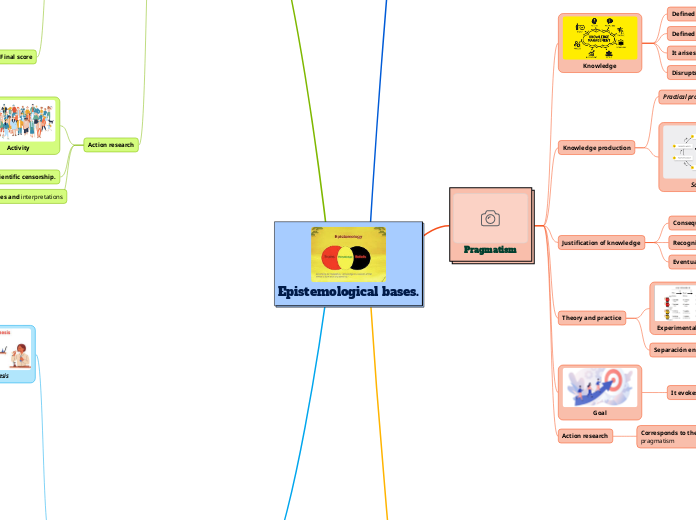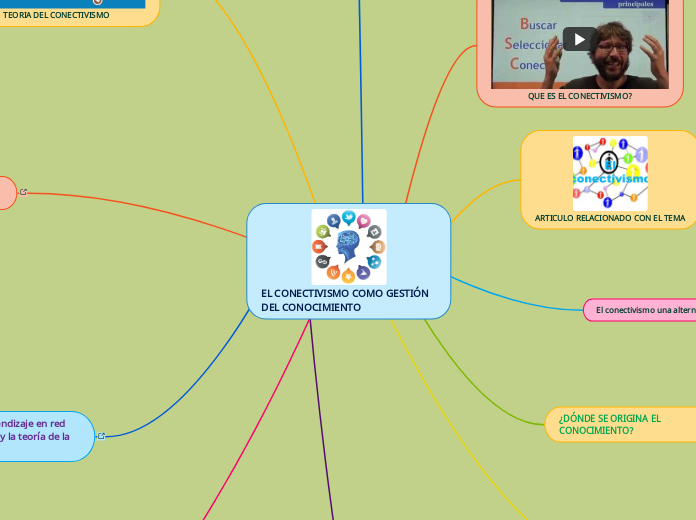Bibliographic references
Tekin, A.K., & Kotaman, H. (2013). The Epistemological Perspectives on Action Research 1. Journal of Educational and Social Research, 3, 81-81.
Oquist, P. (1978). The Epistemology of Action Research. Acta Sociologica, 21(2), 143–163. https://doi.org/10.1177/000169937802100204
Oquist, P. (1978). The Epistemology of Action Research. Acta Sociologica, 21(2), 143–163. http://www.jstor.org/stable/4194229
Epistemological bases.
Action research
is not accepted
Observation
It does not resolve all disputes.
Man
Eliminate the "patently absurd"
Reduces the area of the possible but does not exhaust it
Scientific knowledge
Purpose
Guide the practice
Produces the knowledge that justifies
the knowledge itself.
Investigation process
Results
Discarded hypotheses
Scientific theories
Correctable and attempts
Test hypothesis
Universe of phenomena
Concepts and theoretical presuppositions
Generate
Events and facts
Hypothesis
Previous investigation
Empirical theory
Control
Of variables
Becomes
Facts and events
Definitions
Theoretical presuppositions
Concepts
Answers to leading questions
Hypothesis testing
Directive questions
Conceivable origin
Scientific research is not necessary
Different realities and interpretations
Not considered research scientific.
Not related to scientific censorship.
Activity
Cultural
Social
Religious
Political practice
Knowledge production
Final score
Laws
They meet the conditions
Universal and immutable
Error source
Intentional modification
Requires
They justify the modification
Goal setting judgments
Value criteria
Does not constitute science
Involuntary modification
Disrupts real and natural relationships
Research study object
Human interpretation
Needs to
Practice of rigorous observation
The facts speak for themselves
Theory and practice are not related
The man
Justify knowledge
Produces knowledge
Direct observation
Neutral observation
Free of values
Epistemology of a reality and
true knowledge
Relativism
Separation does not respond to focus
Confuses
Objects of Knowledge and real objects
Center
Exists
Free of all values
Superstructures of a society.
Scientific practice
Inside the thought.
Cualitative
Specific practices
Transform their object types
Materiales, en productos finales
Subtopic
Mode of production
Ideological myth.
Does not exist
General practice
Fully material practice
Absolute vision
Pure theory
Reality
There is an independent entity of knowledge
Does not form the object of knowledge
Distinction
Occurs
Dentro del pensamiento
It has its own internal object
Appropriate reality
It happens by itself
Justification
Method
Internal protocols
Product quality validation
It is characterized by mode or method of reflection
Produces
Concrete thought
Not to be confused with the concrete reality
Tentative and correctable
Knowledge effect
Confrontation
Facts and concepts
Define the problems
Abstract knowledge
Comes from any source
Ideological practice.
Corresponds to the focal point of the
pragmatism
Goal
It evokes the relationship between values and science.
Separación entre saber y hacer
Experimental practice
Union of knowledge and reality
Accountability
Originan la investigación
Justification of knowledge
Eventual for human activity.
Recognizes that knowledge
Consequences of an operation.
Knowledge production
Science
Indicates
Operationalism or instrumentalism.
Directed activity
Random place
Behaviour
Values are purposes
Practical problems
Knowledge
Disrupts "natural" relationships
It arises from human action.
Defined by active operations
Defined by active operations
Dialectical materialism
Action research
Produces knowledge based on a concrete social context.
Theory and practice
Practice
Active, critical and creative intelligence of man.
Natural and social environment,
Be guided by theory
Theory
Action
It does not have value
Human interact
intentionally
Relevant theory
Generate the desired results
Guide practice
Justification of knowledge
it is not a fixed event.
Problem resolution
Social utility
Concrete social praxis
Materialism
Men
Human intelligence
Creative
Selective
Criticism
Active
Shaped by its natural surroundings and Social
Theoretical framework
Social concepts and interrelationships
Guide social analysis
Sensory experience
Directly and neutrally
Rejects ontological and extranatural elements
Idealism
Active mind
Hangover are rejected
Creation like that of the Judeo-Christian tradition.
Epistemological bases
Pragmatism
Logical positivism
Structuralism
Empiricism









